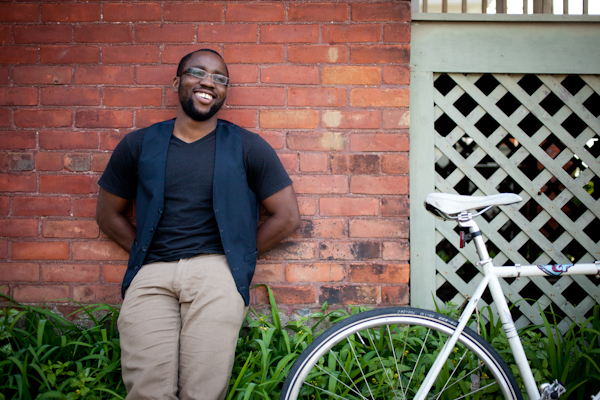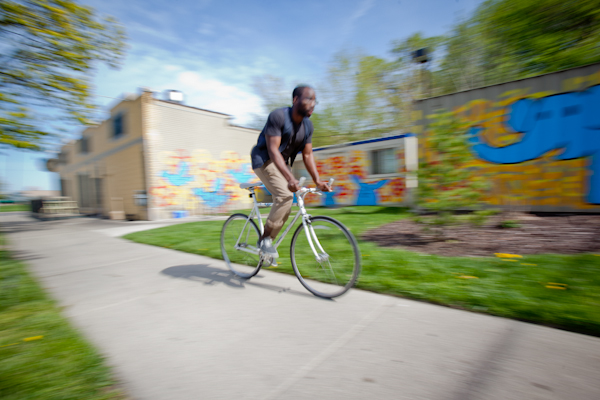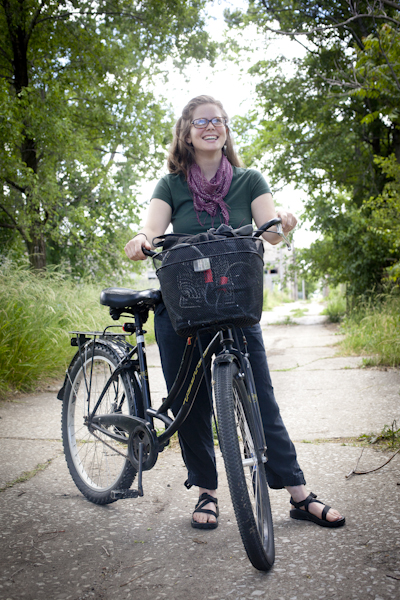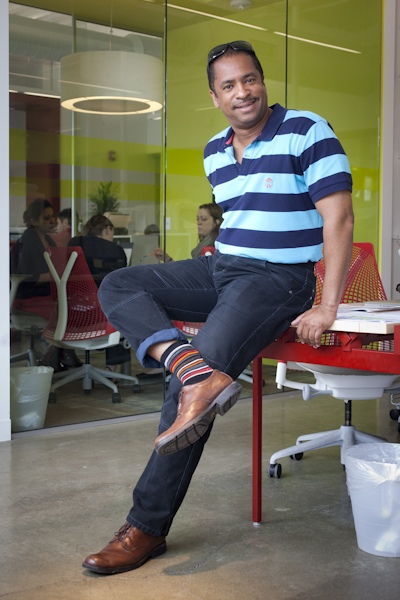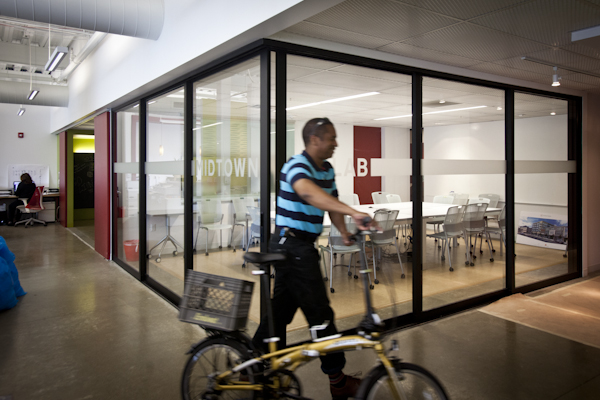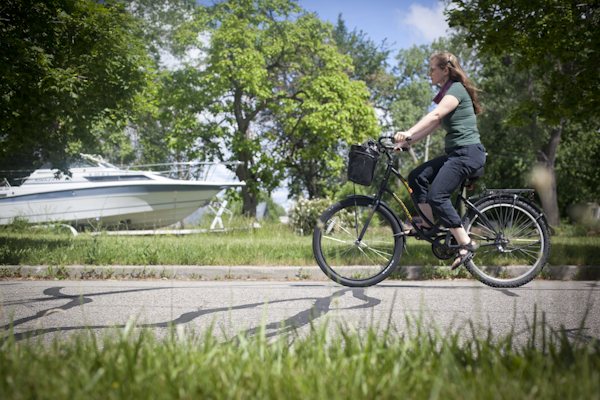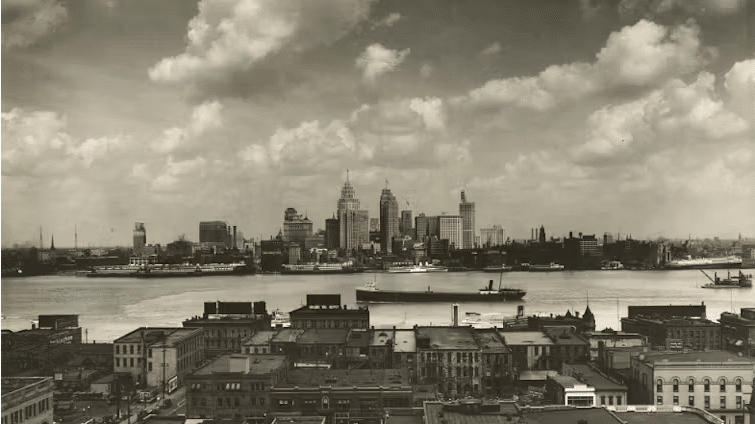Green City Diaries: Motorless meditations
Meet our subjects, three Detroiters who choose to travel with no motor in the Motor City. Their stories and perspectives are distinct, but united by the shared conviction that when it comes to going the distance, bicycling is often best. Matt Piper goes along for the ride.
There’s something about cycling in this city.
Getting around Detroit by bike isn’t exactly new; it started, in fact, in the late 19th century, and has remained an affordable transportation option for resourceful Detroiters for decades. But as in other US cities reimagining themselves with sustainability in mind, the current moment feels, well, momentous. More widespread adoption, greater visibility, and tentative infrastructural developments have all aligned in recent years to suggest that in Detroit, cycling is on the rise and here to stay.
In our previous diary entry, we focused on people who choose to get around Detroit on foot or by bus. Some of the reasons they mentioned included getting to know their city better, the fact that these modes of transit are more social and humanizing than driving, and the regular exercise they provide. Those reasons all apply to cycling too. But urban cycling is a unique transportation experience, and with its apparent local boom, we thought it deserved an entry all to itself. Our subjects this month are three Detroiters who choose to bike the Motor City. Their stories and perspectives are distinct, but united by the shared conviction that when it comes to getting around Detroit, bicycling is often best.
Scott Benson has been riding a bike to work and school in Detroit since 1992, when the Los Angeles native moved here with the Coast Guard. He enrolled in an Urban Planning Master’s program at Wayne State soon after, and started biking regularly to the university from his home in the New Center. He didn’t have a car then, and was used to bike commuting from his undergrad days in Virginia, where he and his roommates would show up to keg parties on their bikes, looking, he recalls, decidedly un-hip.
These days, Scott works for Midtown Detroit, Inc. as a Small Business Development Manager. (He’s also running for 1st District State Rep.) For his work, Scott finds cycling invaluable, but like everyone we talked with for this story, he’s a bicycling enthusiast, not an all-or-nothing fanatic. He usually drives to work from his home near 8 Mile and Gratiot to Midtown’s CoLab on Woodward and Alexandrine, where he keeps his work bike. Once there, it’s all bike (most of the time). Scott’s three to four meetings a week find him tracing an approximately three mile circumference through Midtown and Downtown, and for him, workday cycling is “all about ease of access and convenience.”
“I can make any meeting in 15 minutes,” he said, and in two areas of the city with involved structure parking, not to mention aggressive parking enforcement, that counts. “It’s as easy as rolling up your pants leg.”
Sometimes that’s a suit pant leg, though usually not. Benson’s business-casual attire brought us to an important point in our conversation, since would-be workday cyclists can be easily turned off by the threat of sweat soaked clothes. How does he adapt come summer, when the issue’s most pressing?
“You have to weigh your options,” he said. “If it’s super humid, I might drive.” But if biking is your best or only option at the time, there are ways to make do: “Bike slowly. Wear lighter clothes.”
Hannah Lewis, who commutes by bike from her home in North Corktown to Detroit Massage and Wellness, her Corktown business, recommends packing a change of clothes to prepare for the effects of a hot day. She made the additional point that commuting of any kind takes time, and carries with it additional tasks beyond getting to and fro. As a cyclist, she doesn’t need to factor in time to find a parking spot in a structure, take a ticket, and walk up or down a staircase, but she does allow for time to “put herself back together” once she arrives at her destination.
Hannah started using a bike as her primary vehicle when her husband got a suburban job and needed their shared car for his commute. She described the experience as a “huge change, but so possible. It wasn’t an overnight thing,” but after a one-week trial run, she felt empowered enough to commit to it. And it’s clearly a change she’s delighted to have made.
“My commuting time is productive for my body, my mind, and my community,” she explained. “Being out on the street opens you up to the potential of really healthy interactions with your neighbors…. And it’s a meditative time, since you’re exercising and releasing endorphins. When you’re breathing more, it’s good for your brain.”
Tunde Wey, an avid Detroit cyclist and entrepreneur who’s developing a crowdfunding business, concurs. He called cycling an “active form of meditation,” noting that it creates a mental space in which he feels “vulnerable, aware, and non-judgmental. You accept whatever way you’re feeling.”
In his engaging 2009 book The Bicycle Diaries, David Byrne writes about this meditative quality of cycling: “The activity is repetitive, mechanical, and it distracts and occupies the conscious mind, or at least part of it, in a way that is just engaging enough but not too much–it doesn’t cause you to be caught off guard. It facilitates a state of mind that allows some but not too much of the unconscious mind to bubble up….” Read David Byrne’s thoughts on bike-sharing in this recent New York Times piece.
Hannah describes biking in Detroit as “pleasant for a million reasons.” To start, there’s the fact that the terrain is flat, that biking is both fun and good for you, that you get to be outside, and that there’s so little traffic here compared to other big cities (or the suburbs). She’d observed cyclists in crowded Chicago streets recently and was struck by how stressful the experience seemed: “It wouldn’t be as easy to go from not biking to biking there. It’s so much easier in Detroit.”
All that said, I asked her to discuss how she adapts to some of the real dangers of Detroit cycling, like the occasional life and limb-threatening pothole or non-functioning streetlights. “When you become really familiar with your route,” she explained, “you become pretty aware of the more intimate details of a place. You get used to the potholes and such, and learn where they are in order to avoid them. Also, as you bike more, you learn where the better bike routes are: where there’s less traffic, or fewer potholes, or where the wind isn’t in your face.”
For Tunde — also a writer, who wrote this profile on urban ag catalyst Kirk Mayes in this week’s Model D — feeling a little uncomfortable on his bike is an important step in “feeling like (he) belongs on the streets.” He described a trip from his house in Woodbridge to Southwest that found him riding through vacant, post-industrial landscapes and alongside tractor trailers. “In retrospect, it’s OK that I felt uncomfortable. It’s good. The more you acquaint yourself with the city by finding little nooks and crannies and particular environments, the more comfortable you begin to feel. Ownership only extends to places you’re familiar with, and you deserve to be there.”
Bicycling, he continued, “gives you access to spaces you can’t traverse any other way, or you wouldn’t think to. It provides an opportunity to experience these things more organically, more authentically. It’s the personability of walking with the benefits of a machine.”
So what advice do our three urban cyclists have for others who haven’t yet tried it? “Don’t drink and ride!” Tunde advised sensibly. “If you do, walk your bike.”
Hannah stressed the importance of proper apparel to deal with wind, precipitation, and sun, the “three environmental conditions that make it difficult to bike. You have to have the right kind of stuff. In the summer, I wear a sun hat with a brim. In the winter, it’s good boots and good gloves. Gloves are the serious thing; you need to maintain some level of dexterity.”
“If you’re going to be a biker,” Scott Benson said, “be a responsible biker. Get yourself a bike, but don’t spend too much money. Buy something that’s comfortable for your budget, but won’t break down after a few months. Learn the rules. Get a helmet. Have proper safety equipment: head light, tail light, reflectors.”
After that, all you need to do is ride.
Green City Diaries is a co-production of Model D & the Green Garage Urban Sustainability Library. For a host of resources about cycling in Detroit, including information about cycling safety classes and list of bike-related events in the city and local bike shops, visit our Cycling page. For help answering any other questions about living more sustainably in Detroit, contact the library here. To suggest future Green City Diaries story ideas, contact us here.
We’d love it if you shared your experiences biking in the city in the comments below! Thanks for the lively conversation last time.
Photos by Marvin Shaouni
